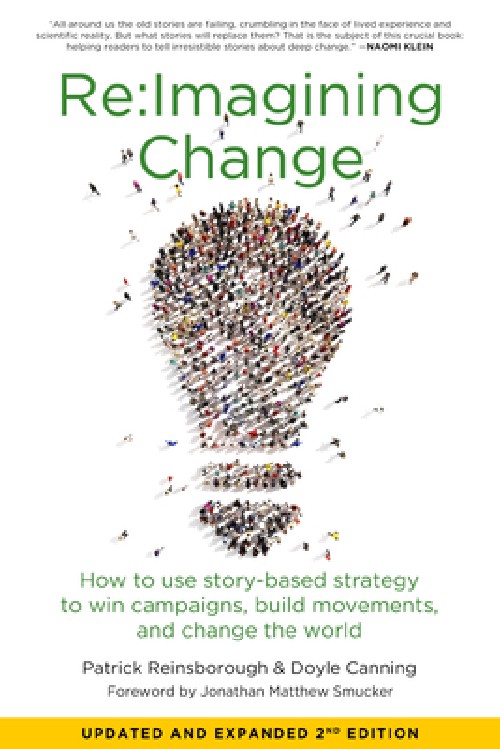The New Yorker published a good review of a new book, Adaptable: How Your Unique Body Really Works and Why Our Biology Unites Us that helped me make sense of an idea I’ve been stewing on lately. I’m writing a quick, shitty post to capture it, in the hopes that I can keep expanding later.
Through my day job in the past few years, I’ve noticed how important storytelling is to humans to make sense of everything. At work I’m a PM, and it’s my job to synthesize a wide variety of data, inputs, and opinons and shape the synthesis into a narrative. When I do my job well, the people around me understand what we’re working on, and why, and what they need to do. It’s through this job that I’ve really come to appreciate how much storytelling is important to every day life.
This has led me to to pay deep attention to how helpful accurate stories are in actively unfolding events. We humans are narrative animals; we’re experience our lives as unfolding stories, and we map those stories onto other stories to make sense of them. If you are walking on a sidewalk and trip over a crack, there are many many ways you can make sense of that. You can think it’s a random event, and it happened because you weren’t paying attention. You can think it’s a sign from a deity. You can think it’s a clear sign that your tax dollars aren’t being spent accurately. And so on. These stories aren’t exclusive, any event might be made sense of through a variety of stories.
A key thing to notice in that example is that stories always tap into other stories; you are never experience the world as a decontextualized, meaningless space. Every human has experiences and knowledge that they bring with them, helping them map the events they are experiencing and make sense of them.
This is what I mean when I say humans are narrative animals.
Currently, in the US, and unfortunately therefore globally, there are significant, terrifying events unfolding. The US hired an angry, senile bull to manage our expensive ceramics shop, and well, we are reaping what we have sown.
And because I know stories are so important to us, I’m thinking a lot about how we can create narratives of the moment that are accurate without being so tedious as to bore. How can those of us (many millions!) who are opposed to the harms and chaos of the moment be the ones to tell the story of the moment, so that those with power can’t also control the narrative, even if they control the systems of power.
Here’s my working start. It’s nascent, and so far has been built in isolation. I believe the best stories about unfolding events can’t be built in isolation, they need to be collaborative. The work of building consensus around a narrative is the work of improving and clarifying the narrative. So I’m putting this out to see if it resonates, to see if there are even better ways to say it.
A Story for the moment
We are, in this moment, in a battle between the existence of many complex, richly diverse, thriving futures, and the existence of a simple, complicated, fragile future. The people who have siezed power in the US are actively building the latter vision; but the vast majority of people want the former. I will explain my thinking.
It’s helpful to define 3 words in that last paragraph. First, “complex” is a word I take from complex systems, and it refers to a thing made up many interconnected parts. You, as a human, are a complex system, with your many biological systems that interact with each other in order to keep you alive and conscious. Complexity is the opposite of simple; to be “simple” is to not have many interconnected parts. Not many things are simple in the world unless you break things down to their consituent parts; electrons and amino acids and elements, for example. Simple is very difficult to achieve because the universe starts at the atomic level and works up from there, even examples like “a piece of blank paper” lack simplicity, because it relies on the existence of materials that have been grown, extracted, processed, etc.
Complex and simple are very useful concepts because already we can see that most everything in life is complex, but complex things are always built out of core simple things. There is one more word that helps me get a richer picture of these opposites, and that word is “complicated.” Credit to Don Norman for initially introducing me to this framing. Where complexity is natural and found everywhere you look in the universe, “complication” is useful for distinguishing systems in balance (meaning, working well) versus systems that are fragile and likely to implode. Complicated systems are not self-balancing, they cannot adapt to sudden changes, they require active maintenance to stay operational.
Complicated systems are a subset of complex systems; not all complex systems are complicated, but all complicated systems are complex. Complicated systems are most often the type of systems we have built as humans.
Keeping these definitions in mind, I want to unpack my story.
The United States—ever since white people stole the land and started building on it—has grown more and more complicated. White people took a continent that had been inhabited for well over 100,000 years by people who learned to work with the complexity of the land. Those people had built relationships with the land and animals they lived with, and learned to thrive without extraction or decimation. White people came, claimed the land was uninhabited, and started extracting everything they could without any consideration of the future. White people also invaded another continent and enslaved people and imported them to this continent as labor.
From these original sins, we’ve built a country. From the early days, our infrastructure has been built as a complicated system layered on top of the land, in order to support extraction. We’ve built up a system where many people have gotten rich by extracting whatever we could find a market for; beaver skins, cotton, wheat, timber, oil, gas, technology of war, financial products, software, and so on. In each era of extraction, infrastructure has been built to make it easier for profits to be made.
I think one way of framing this history is that the complicated systems of extraction, infrastructure, and profit were made possible because white men enforced comically, horrible simple stories about how the world works. By believing and operating within these simple stories, white men could ignore the vast complexity of the world and focus only on the things they wanted to care about.
They (we) could build a wildly complicated infrastucture of capitalism because there was no concern for the variety—the diversity—of human needs. Of plant and animal needs. White dudes enforced narratives of hierarchy; that the prototypical human is a white man, that all other humans are lesser. Women are the weaker gender. People of color are less evolved. Disabled people are outcasts. Only heterosexuality is allowed, because procreation is the highest good. That work is the highest good, and all other human needs are subservient to it. That all of life can be ordered in hierarchy, and all humans are identical. So on and so forth. These stories came from religion, from science, from people who were telling stories that served their own needs regardless of harm caused to others.
Once the stories were written, they were enforced. Black people were defined as less-than-human legally. Indigenous people were defined as outside-the-law. Everyone who was not considered white and cis male was given fewer or none protections, and forced to exist at a lower priority across all of civilization.
To be clear, ever since those stories were written and enforced, they have been contested. At no point since white dudes decided the world was theirs to own and control have they successfully gained full consensus on their plans—the people they have murdered, raped, enslaved, harmed, dismissed, and more have always been fighting to deny their beliefs. But, through disease, colonialism, technology, bureaucracy, and debt, white men siezed and have mostly retained power for the past few centuries.
This framing is useful because it helps me tell the story of what is happening now, in the US. The supremacy of white dudes has always been contested; go read The Rediscovery of America or Reconstruction or any number of books about the ways that the fight for dismantling the power systems that shape the world is ever ongoing. But there is an inflection point that happened in the past 30 years because the shape of power shifted. Since the early 1990’s, the internet has been adopted around the world. In the past 20 years, social media has vastly changed the way that information travels, and specifically making it so that the power structures that had previously limited which stories saw broad distribution suddenly had far less gatekeeping ability.
There is a joking analysis I’ve seen online that feels funny because it feels accurate: rich people and people in power have lost their minds because the internet—specifically social media—popped their bubbles of positivity. Prior to the past ~20 years, people in power mostly could pretend that they were doing good and people liked them. The complicated systems of media and information served to coddle their feelings, to insulate them from criticism and critique.
And they were really fucking attached to that coddling.
The story is a bit clearer now, althought there’s much more I should expand on.
I believe that we can look at what is happening under this administration in the US as the second coming of redemption. After the civil war, the US entered a period known as Reconstruction; for a brief moment in history black people in the US had full rights of citizenship. Many white people in the US experienced that period as an attack on their existence, and they responded with fury, leading to the Jim Crow era with lynchings, vast migrations, and continued horrors (the Civil Rights act addressed some of this, but the past decade of Black Lives Matter shows that the horrors never actually were addressed).
But I think this period we are actively in is not simply a racial backlash. It is an entire economic order backlash. I look at the past few decades as a period when complexity was emerging out of complication. The systems we lived under prioritized white men’s needs, and those systems were not just legal, but were in every domain of life. The education system, the healthcare system, the scientific research system, the transportation system, the supply chain system, every single system was being interrogated for the ways it had adopted the logic of white cis supremacy. These interrogations were starting—just barely—to lead to shifts that were more sustainable and representative of all beings. Just barely.
This is what we are seeing described as “woke”— the nascent transformation of massive, complicated systems that only prioritized certain people into massive, complicated systems that might allow for more priorities, such as those of all the humans fucked over by the current systems. And maybe even some of the land and non-human creatures also fucked over by the systems.
Alas, the backlash seems to be strong, but it also feels incredibly idiotic. White dudes are grabbing all the systems they can find and trying to re-establish a world where they are the only living beings that matter. Every single initiative that takes into account other’s needs is being dismantled, destroyed, undone, as rapidly as possible.
These fuckers are trying to institute the most fragile, limited vision of the future possible. They want their needs alone to matter, and their access to money alone protected. And they are trying to enforce rules and ways of being that deny every other expression of life.
Unfortunately for them, the dam has broken. The alternate stories are already written. Our imaginations have been captured by worlds that were emerging, worlds that do not center the supposed supremacy of people like me. Worlds that are complex, varied, caring and sustainable. As much as we are seeing critical systems crumble around us, in real-time we are also seeing people narrate why those systems matter, what those systems provide, what harms we will encounter without those systems. That means that the vision this US administration is using all its might to enforce has already lost.
I didn’t mean to end on such a hopeful note but I guess that’s where I am. I look around and I see that millions of people have been fighting these systems for centuries. The future that assholes are working to define is not guaranteed. Their future is dependent on every human without power falling in line, doing what others tell them to, and denying their own dreams and hopes. I look around and I don’t see many people who are willing to do that. That gives me hope.



